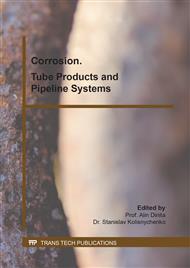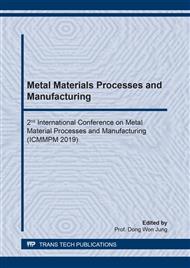p.90
p.96
p.102
p.108
p.115
p.123
p.130
p.139
p.148
Evaluation and Field Test of Corrosion Inhibitors of Oil Tube Carbon Steel from Shaanbei Oilfield
Abstract:
This paper deals with the investigation of the corrosion situation of oil wells on site. On the basis of water quality analysis, the corrosion status of the site was studied on J55 steel used in the field. The most severe water sample was selected as the medium for electrochemical evaluation and on-site. The screening of four corrosion inhibitors was conducted in our study. Results showed that the salinity of the produced water is relatively high (average value of 29819 mg/L), the chloride ion content is high (average value of 17762.8 mg/L), and the corrosion rate is up to 0.1345 mm/a. Scanning electron microscopy (SEM) was used to analyze the corrosion products and morphology of the studied samples. In the electrochemical evaluation test, the TS-001 corrosion inhibitor has a good corrosion inhibition rate, which can reach up to 97.75% when the dosage is 100 mg/L.
Info:
Periodical:
Pages:
115-120
DOI:
Citation:
Online since:
February 2020
Authors:
Keywords:
Price:
Сopyright:
© 2020 Trans Tech Publications Ltd. All Rights Reserved
Share:
Citation:



